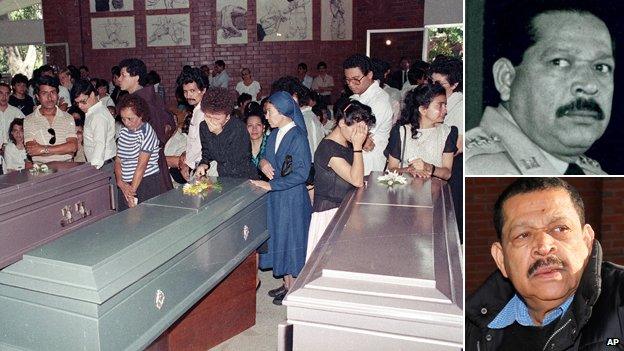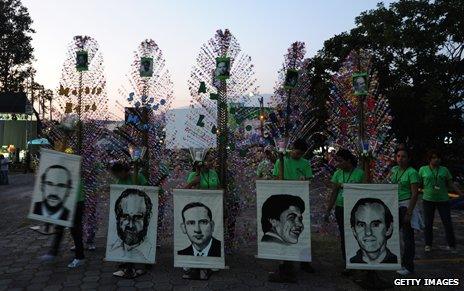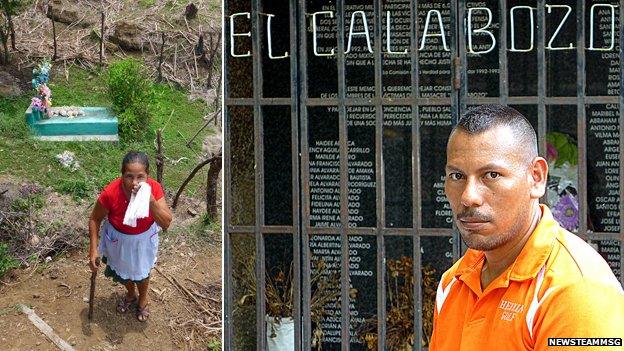Will Col Inocente Orlando Montano face criminal trial?
- Published

Mourners at the coffins of the murdered priests in 1989; and Col Montano then and now
The commander of one of El Salvador's notorious death squads, active during the 1979-92 civil war, could soon become the first top-ranking Salvadoran officer to face trial for murder. But if so, he will be tried in Spain, not his own country, where an amnesty protects even those guilty of atrocities against civilians.
Inocente Orlando Montano was quietly working in a sweet factory in Massachusetts in May 2011, when he and 19 others were indicted by a Spanish court for their alleged role in the 1989 murder of six Jesuit priests, along with their housekeeper and her teenage daughter.
Five of the priests - outspoken critics of El Salvador's military and suspected of being sympathisers of left-wing rebels - were Spanish. Spain asked for Montano to be extradited - and soon afterwards he was indicted by the US for having lied about his entry date and military past to obtain papers giving him the right to work in the US.
He pleaded guilty in September last year to six counts of immigration fraud and perjury and will be sentenced on Monday.
As vice-minister of public security, Colonel Montano had been one of El Salvador's top three military leaders. He was also commander of the feared Belloso Battalion.
In an expert report prepared for Montano's prosecution, political science professor Terry Karl argues that at least 1,169 human rights abuses - including 65 extra-judicial killings of named individuals, 51 reported disappearances and 520 torture victims - were carried out by units under Montano's command.
"The Jesuit massacre was not an aberration," she writes.

Catholics in San Salvador mark the anniversary of the priests' deaths
"Throughout Col Montano's 30-year military career, he ordered, abetted and assisted, and/or commanded troops that participated in a strategy of disappearance and arbitrary detention, rural massacres of civilian non-combatants, the forced disappearance of children, and the toleration of military-led death squads operating inside units under his command."
The US federal judge has indicated that Montano's sentence will reflect the gravity of his alleged human rights record - detailed in Karl's report and in testimonies from priests and civilian survivors of torture.
The San Francisco-based Center for Justice and Accountability (CJA), which helped trigger the indictment by filing a criminal complaint in Spain four years ago, expects the extradition process to begin while Montano is in US custody.
Up to now, no top-ranking Salvadoran commander has faced criminal prosecution for any civil war offence.
Two others who "retired" to Florida - Generals Jose Guillermo Garcia and Carlos Vides Casanova - have been fighting deportation proceedings brought under a post-9/11 law intended to stop human rights violators residing in the country.
Both have also been sued in the civil courts. In 2002, a West Palm Beach jury found them guilty of torturing three civilians and awarded $55m, $300,000 of which has so far been paid.
But the immigration proceedings against Montano have already arguably done more to raise hopes among civilian victims that justice may one day be done, by legally dissecting several atrocities for the first time.
One is the El Calabozo massacre, in which 200 to 300 campesinos, or peasant farmers, were killed on 22 August 1982 by the Belloso Battalion under Montano's command, and the equally feared Atlactl Battalion.
El Calabozo was a scorched-earth operation carried out by the US-trained mobile death squads against alleged guerrilla supporters. The soldiers killed unarmed civilians, kidnapped children for illegal adoptions, bombed homes and destroyed crops.
The Salvadoran government has never officially recognised that the massacre took place.
Chunguita Realegeno, 58, who lost her whole family except one son in the massacre, says: "I hid with my baby for three days without food or water because we couldn't keep walking; I never saw my family again, I only found their bones. I suffer every day and night knowing those who killed my people are still free."

Massacre survivors Chunguita Realegeno and her son, Ezequiel de Jesus
Prof Karl will testify in court on Thursday - the 31st anniversary of the massacre - as will General Mauricio Vargas, who Montano has called as an expert to challenge the allegations.
"A case like Montano's immigration prosecution provides a glimmer of hope that some truth and accountability will emerge from decades of lies, denial and impunity.," says Esther Major, Amnesty International's El Salvador researcher. "Evidence is being reviewed, massacres recognised as having happened, victims and survivors' words matter."
At one point, it seemed that El Salvador itself might repeal the amnesty law for former combatants, passed in 1993 in defiance of the terms of the peace agreement signed the previous year.
In 2000, the former rebels FMLN (Farabundo Marti National Liberation Front) won a legislative majority against the military-allied Arena party - the sort of political change which preceded the collapse of amnesties in Chile, Argentina, Guatemala and Honduras.
The successful prosecutions around this time of Gen Augusto Pinochet in Chile and Col Byron Disrael Lima Estada in Guatemala - both of which had once seemed impossible - caused reverberations in El Salvador.
Montano entered the US in 2001 just when it seemed the Jesuits massacre would be reinvestigated. But it was only in 2009 that an FMLN candidate, Mauricio Funes, became president, and he has not made repealing the amnesty law a legislative priority.
Not surprisingly, Montano has volunteered to return to El Salvador after serving his sentence in the US. The country's Supreme Court has already rejected Spain's request for the extradition of 17 of Montano's co-accused in the Jesuit massacre case, including former president Alfredo Cristiani.
Of the remaining two accused, one is dead and the whereabouts of Lt Hector Cuenta Ocampo, who occupied a prominent position in the National Intelligence Service, is unknown. His last known address was in San Francisco.
"The impunity continues, well protected and well incubated," says Neris Amanda Gonzale, one of the torture victims who won the 2002 civil case against Vides Casanova and Garcia.
"If you bury and rub out historical memory, there will be new conflict and violence. Without an apology and justice, we can't have peace in this country."
You can follow the Magazine on Twitter, external and on Facebook, external